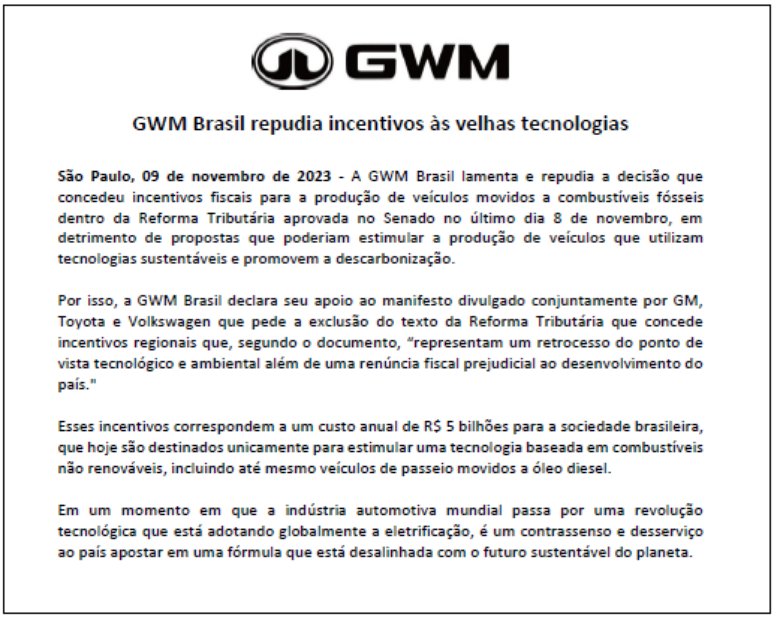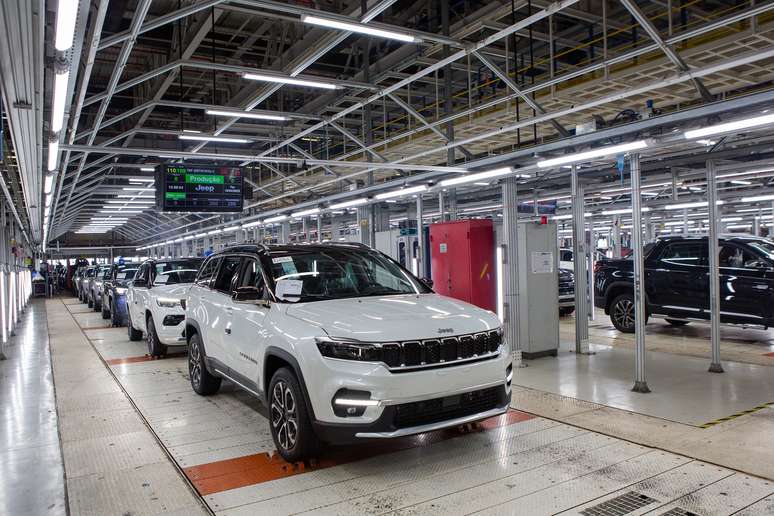Turning Point in Tax Reform Causes General Motors, Toyota and Volkswagen to React Together; GWM repudiates the reform article
Should Stellantis continue to receive tax exemption for manufacturing automobiles in the Northeast? This is the issue that caused a historic schism in Anfavea and which has now, with the approval of the Tax Reform, become a declared war.
On the one hand, three automakers that produce vehicles in the South and Southeast (GM, Toyota and Volkwagen) believe that the incentive for Stellantis to produce cars in Goiana, PE, is becoming “eternal.” And they believe the end of tax incentives is certain in 2025.
On the other hand, Stellantis claims to have brought several companies to the region and that the 13 municipalities in the region have had enormous economic and social development. Therefore, efforts are being made to extend the tax exemption until 2032.
The straw that broke the camel’s back was the inclusion of a benefit for flex-fuel cars in the tax reform text unveiled last Wednesday, 8. Until then, GM, Toyota and Volkswagen had been content with the end of the subsidies in 2025 and their extension only to hybrid cars. or electric vehicles, which was the intended text
Stellantis enjoys a 10 percentage point exemption from ICMS (2% instead of 12% of 2%) and a full exemption from IPI (11.6% per vehicle produced). Since 2021, through an injunction, Stellantis has transferred the exempt surplus to its operations in Betim, MG, and Porto Real, RJ.
Since Stellantis managed to include in the text that the benefit will remain active for flexible fuel cars (not necessarily electrified) until 2032, the three automakers – GM, Toyota and VW – released a jointly signed open letter, calling for the “ immediate cancellation” of three paragraphs of article 19 of the tax reform currently being examined by the National Congress.
This Thursday the 9th, the Chinese GWM, which still does not produce cars in Brazil, decided to join the chorus against Stellantis and issued a “note of repudiation” for “incentives to old technologies”.

It is worth mentioning that starting next year, another Chinese automaker, BYD, will start producing hybrid and electric vehicles in Bahia. GWM has chosen Iracemápolis, SP, to start its operations.
According to the Federal Court of Auditors, the benefit of production in the Northeast generated a tax reduction of R$5 billion between 2010 and 2022. Stellantis argues that distribution costs from the Northeast are much more expensive. And since the opening of the Pernambuco plant, ICMS collection in the state has jumped from R$204 million to R$917 million.
Furthermore, the Goiana region, which received several factories from automotive suppliers Jeep (Renegade, Compass, Commander), Fiat (Toro) and Ram (Rampage), recorded an average annual GDP growth of 6.3%, with the provision of quality jobs, housing construction and other services that did not previously exist in the location.
General Motors, Toyota and Volkswagen want tax reform to be “fair and equitable for all”. These automakers also had tax incentives to locate in the regions chosen for their factories – and this became a norm to attract automakers.
The case of Stellantis attracts attention because it has been renewed frequently and takes place in a region of the country normally neglected by the industry, and which has become an important hub for the car manufacturer, which has already chosen it as the first national production of hybrid vehicles and electric cars, based on 2024.
Source: Terra
Rose James is a Gossipify movie and series reviewer known for her in-depth analysis and unique perspective on the latest releases. With a background in film studies, she provides engaging and informative reviews, and keeps readers up to date with industry trends and emerging talents.







